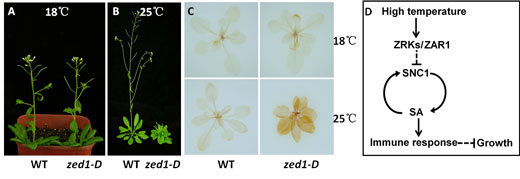Progresses on temperature-dependent intersection of plant immunity and growth homeostasis
Plant growth and immune response are both energy cost processes, which should be well balanced. High temperature promotes growth and inhibits immune responses so as to allow more energy for growth needs. However, it is still an open question about how temperature regulates the antagonism of growth and immunity.
Researchers from the Institute of Botany, Chinese Academy of Sciences (IBCAS) have recently found that a dominant negative mutant of ZED1 (HopZ-ETI-Deficient 1), zed1-D, showed a high temperature-dependent growth retardation and autoimmunity activation. Such growth defects and autoimmunity in zed1-D are dependent on ZAR1 (HopZ-Activated Resistance 1), a direct interactor of ZED1. Further analysis revealed that ZED1 and several ZRK (ZED1-related Kinase) family members are induced by elevated temperature and function cooperatively to suppress the immune response by modulating the transcription of SNC1 (Suppressor of NPR1-1 Constitutive 1) in the absence of pathogens. zed1-D is the first identified high temperature-sensitive autoimmune mutant so far. Based on this mutant, a series of data reveal a previously unidentified role of ZRKs in the ambient temperature-sensitive immune response in the absence of pathogens, and thus advance our understanding of how plants optimize their growth and development in response to the ever changing environments.
This work has been published on line in May 12th on the international journal, New Phytologist. This article is co-first authored by PhD student Zhicai Wang, Dr. Dayong Cui, and Dr. Jing Liu from Yuxin Hu’s Lab in IBCAS, and is supported by grants from the National Natural Science Foundation, China. Prof. Yuxin Hu is the corresponding author.
Article link: http://onlinelibrary.wiley.com/doi/10.1111/nph.14585/full

(A) Wild-type (WT) and zed1-D plants grown under low temperature condition (18℃). (B) WT and zed1-D plants grown in high temperature (25℃). (C) ROS (Reactive Oxygen Species) accumulation in WT and zed1-D. (D) The proposed working model for ZRK-mediated intersection of immunity and growth homeostasis in plants.
Researchers from the Institute of Botany, Chinese Academy of Sciences (IBCAS) have recently found that a dominant negative mutant of ZED1 (HopZ-ETI-Deficient 1), zed1-D, showed a high temperature-dependent growth retardation and autoimmunity activation. Such growth defects and autoimmunity in zed1-D are dependent on ZAR1 (HopZ-Activated Resistance 1), a direct interactor of ZED1. Further analysis revealed that ZED1 and several ZRK (ZED1-related Kinase) family members are induced by elevated temperature and function cooperatively to suppress the immune response by modulating the transcription of SNC1 (Suppressor of NPR1-1 Constitutive 1) in the absence of pathogens. zed1-D is the first identified high temperature-sensitive autoimmune mutant so far. Based on this mutant, a series of data reveal a previously unidentified role of ZRKs in the ambient temperature-sensitive immune response in the absence of pathogens, and thus advance our understanding of how plants optimize their growth and development in response to the ever changing environments.
This work has been published on line in May 12th on the international journal, New Phytologist. This article is co-first authored by PhD student Zhicai Wang, Dr. Dayong Cui, and Dr. Jing Liu from Yuxin Hu’s Lab in IBCAS, and is supported by grants from the National Natural Science Foundation, China. Prof. Yuxin Hu is the corresponding author.
Article link: http://onlinelibrary.wiley.com/doi/10.1111/nph.14585/full

(A) Wild-type (WT) and zed1-D plants grown under low temperature condition (18℃). (B) WT and zed1-D plants grown in high temperature (25℃). (C) ROS (Reactive Oxygen Species) accumulation in WT and zed1-D. (D) The proposed working model for ZRK-mediated intersection of immunity and growth homeostasis in plants.